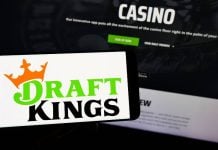DraftKings CEO Jason Robins has told investors that the acquisition of digital lottery service Jackpocket can be a powerful marketing tool allowing the operator to onboard new customers year round.
Addressing investors at DraftKings’ Q4 earnings call, Robins compared Jackpocket to the operator’s DFS product, noting that it has the potential to be a “nice little earner” for the firm but the real value is in the customer database and the power for cross-selling.
Robins explained: “DFS is a nice little product that makes money for us but it’s not something that is going to drive the massive top line growth. That’s really the OSB and igaming. It’s more of a vehicle to be able to continue to acquire customers and engage customers in states that don’t have that yet. And I think Jackpocket will do the same thing.
“I think in states that do have OSB and igaming, it’ll provide us another vehicle to acquire cheaply. One of the cool things I think, is if you look at sort of where a lot of customer acquisition happens, now, it’s during these big moments, whether that’s the Super Bowl or March Madness coming up, or any of those things, it’s those big tentpole moments.
“What Jackpocket does is it creates more of those big mass cheap customer acquisition opportunities during the year. It could be any time right, like the middle of August when there’s suddenly a billion dollar jackpot and we’re the only ones who are able to actually acquire in mass right before the NFL season starts..”
DraftKings announced the agreement to acquire Jackpocket late yesterday for around $750m, with the deal set to close at the end of 2024 or start of 2025.
The integration period is set to have little material impact on the firm’s bottom line and Jackpocket is set to make a positive contribution from 2026 onwards.
Robins explained that there is ample opportunity for DraftKings to cross-sell to Jackpocket’s database of customers and cited research during due diligence that found online lottery players are much more likely to play other verticals such as sports betting and igaming.
“The fact that there’s overlap shows us that the customers are very similar. We looked at a number of different data points to verify that from demographic data to other behavioural insights and graphical stuff. I think the idea is that overlap was with zero CRM or actual effort put towards cross sell at’s nowhere near the cross sell that we’ve been able to achieve from OSP to igaming. So we think there’s a tonne of upside there with real meaningful effort put towards that.”
Barstool deal “as good as it gets”
Another significant deal that DraftKings pulled off in recent weeks is a marketing deal with Barstool Sports, after the firm’s non-compete deal with PENN Entertainment expired following the Super Bowl.
Management noted that there are significant advantages to working with Barstool given that they have worked together before and that the Dave Portnoy-led group has a strong record of converting fans into bettors.
“We’re very excited about that,” Robins told investors. “We worked with Barstool many times over the years and we’re really thrilled to be working with them again. It’s a partner that we know very well and have tons of data on so we felt really good. This is about as good as it gets in terms of us having historical data and being able to underwrite this deal. So it’s really exciting. And we believe it’ll be a strong performer for us.”
The Barstool deal comes at a time that DraftKings is continually looking to optimize its marketing efforts as it chases down profitability. Having missed its full year adjusted EBITDA target by around $50m, it is looking to optimize further.
Robins elaborated, explaining that there are plenty of marketing tricks up DraftKing’s sleeves and that the Barstool deal is just one lever it will pull going forward.
He noted: “As you know, our relationship with ESPN ended late last year. But I wouldn’t say there’s like any one thing we’re constantly optimizing in and out. Actually most of our spend is not committed, most of our spend is done through buying that we can pull in and out of it any various points of time.
“So there’s a tonne of different levers that we can pull as we think about funding different agreements. Right now, I think given sort of the pace and cadence of what we expect state launches to be in 2024, barring some big surprise, I don’t think you’re going to see an increase in marketing. This year, it’s going to be much more of a focus on deploying our dollars much more effectively and I think barstool is a great example of that.”
DraftKings’ Q4 and full year numbers
Publishing its financial results, DraftKings reported a 44% increase year-over-year in revenue to $1.23bn during Q4 (Q4 2022: $855m). For the full year, revenue came in at $3.67bn, up on the previous year’s $2.24bn.
However, DraftKings failed to meet its Q4 adjusted EBITDA target of approximately $200m previously communicated during its Q3 earnings report, as the figure came in at the end of the reporting period at $151m, an improvement on Q4 2022’s $49.9m loss. For the full year, adjusted EBITDA stood at a $151m loss.
November’s sporting results were infamously poor for operators as highlighted across the board in state revenue reports. They also impacted Q4 revenue and adjusted EBITDA by approximately $175m and $126m, respectively.
The operator’s monthly unique players in Q4 increased by 37% to 3.5 million, while average revenue per MUP was $116, a 6% increase YoY and a 22% increase when adjusted for customer-friendly sport outcomes.
Finally, DraftKingsraised its 2024 revenue and adjusted EBITDA guidance previously communicated within its Q3 results in November last year.
2024 revenue is projected to be between $4.65bn to $4.9bn which would equate to a YoY growth of 27%-34%. 2024 adjusted EBITDA is now expected to be between $410m and $510m.













